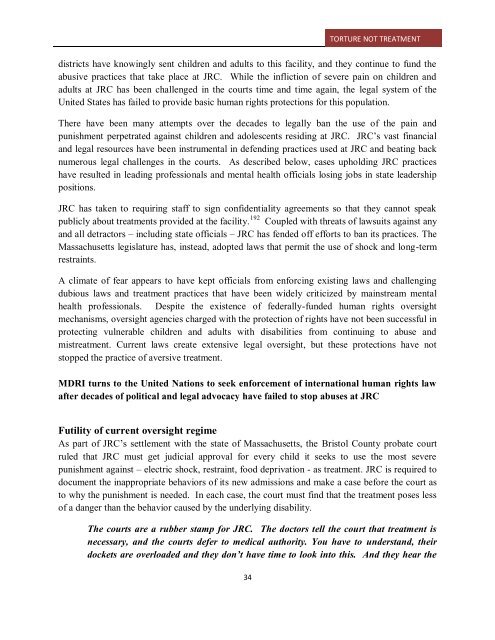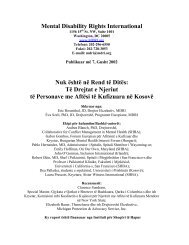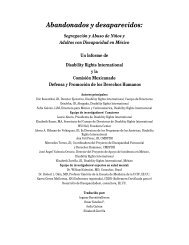Torture not Treatment - Disability Rights International
Torture not Treatment - Disability Rights International
Torture not Treatment - Disability Rights International
You also want an ePaper? Increase the reach of your titles
YUMPU automatically turns print PDFs into web optimized ePapers that Google loves.
TORTURE NOT TREATMENT<br />
districts have knowingly sent children and adults to this facility, and they continue to fund the<br />
abusive practices that take place at JRC. While the infliction of severe pain on children and<br />
adults at JRC has been challenged in the courts time and time again, the legal system of the<br />
United States has failed to provide basic human rights protections for this population.<br />
There have been many attempts over the decades to legally ban the use of the pain and<br />
punishment perpetrated against children and adolescents residing at JRC. JRC‘s vast financial<br />
and legal resources have been instrumental in defending practices used at JRC and beating back<br />
numerous legal challenges in the courts. As described below, cases upholding JRC practices<br />
have resulted in leading professionals and mental health officials losing jobs in state leadership<br />
positions.<br />
JRC has taken to requiring staff to sign confidentiality agreements so that they can<strong>not</strong> speak<br />
publicly about treatments provided at the facility. 192 Coupled with threats of lawsuits against any<br />
and all detractors – including state officials – JRC has fended off efforts to ban its practices. The<br />
Massachusetts legislature has, instead, adopted laws that permit the use of shock and long-term<br />
restraints.<br />
A climate of fear appears to have kept officials from enforcing existing laws and challenging<br />
dubious laws and treatment practices that have been widely criticized by mainstream mental<br />
health professionals. Despite the existence of federally-funded human rights oversight<br />
mechanisms, oversight agencies charged with the protection of rights have <strong>not</strong> been successful in<br />
protecting vulnerable children and adults with disabilities from continuing to abuse and<br />
mistreatment. Current laws create extensive legal oversight, but these protections have <strong>not</strong><br />
stopped the practice of aversive treatment.<br />
MDRI turns to the United Nations to seek enforcement of international human rights law<br />
after decades of political and legal advocacy have failed to stop abuses at JRC<br />
Futility of current oversight regime<br />
As part of JRC‘s settlement with the state of Massachusetts, the Bristol County probate court<br />
ruled that JRC must get judicial approval for every child it seeks to use the most severe<br />
punishment against – electric shock, restraint, food deprivation - as treatment. JRC is required to<br />
document the inappropriate behaviors of its new admissions and make a case before the court as<br />
to why the punishment is needed. In each case, the court must find that the treatment poses less<br />
of a danger than the behavior caused by the underlying disability.<br />
The courts are a rubber stamp for JRC. The doctors tell the court that treatment is<br />
necessary, and the courts defer to medical authority. You have to understand, their<br />
dockets are overloaded and they don‟t have time to look into this. And they hear the<br />
34




